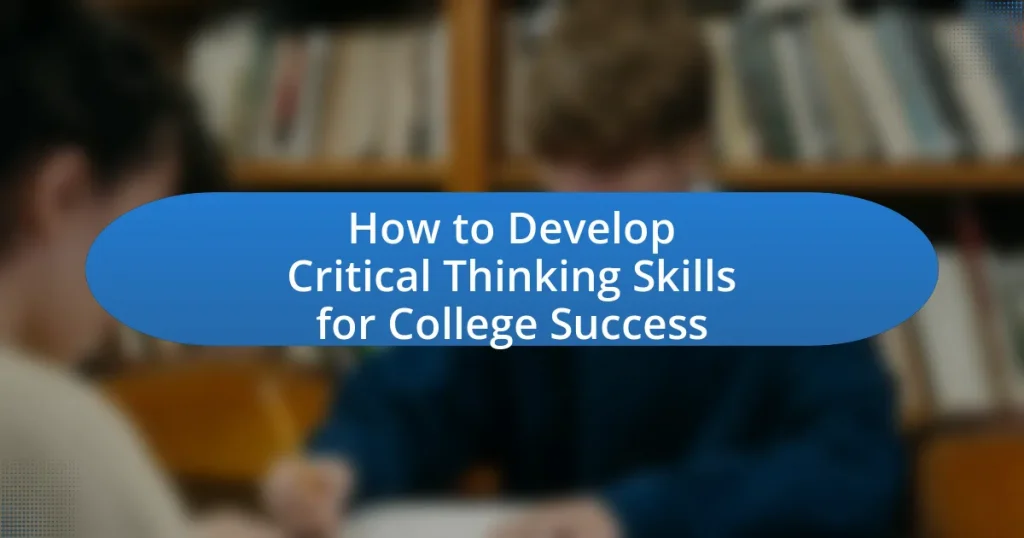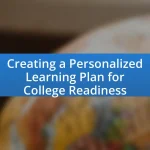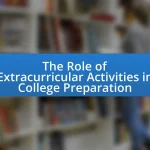Critical thinking skills are essential for college success, enabling students to analyze, evaluate, and synthesize information effectively. This article explores the significance of critical thinking in academic performance, highlighting its correlation with improved grades and decision-making abilities. It identifies key critical thinking skills such as analysis, evaluation, inference, and problem-solving, and discusses strategies for developing these skills through practice, feedback, and collaborative learning. Additionally, the article addresses common challenges students face in cultivating critical thinking and offers practical tips for enhancing these abilities, ultimately emphasizing their importance in achieving academic and personal success.
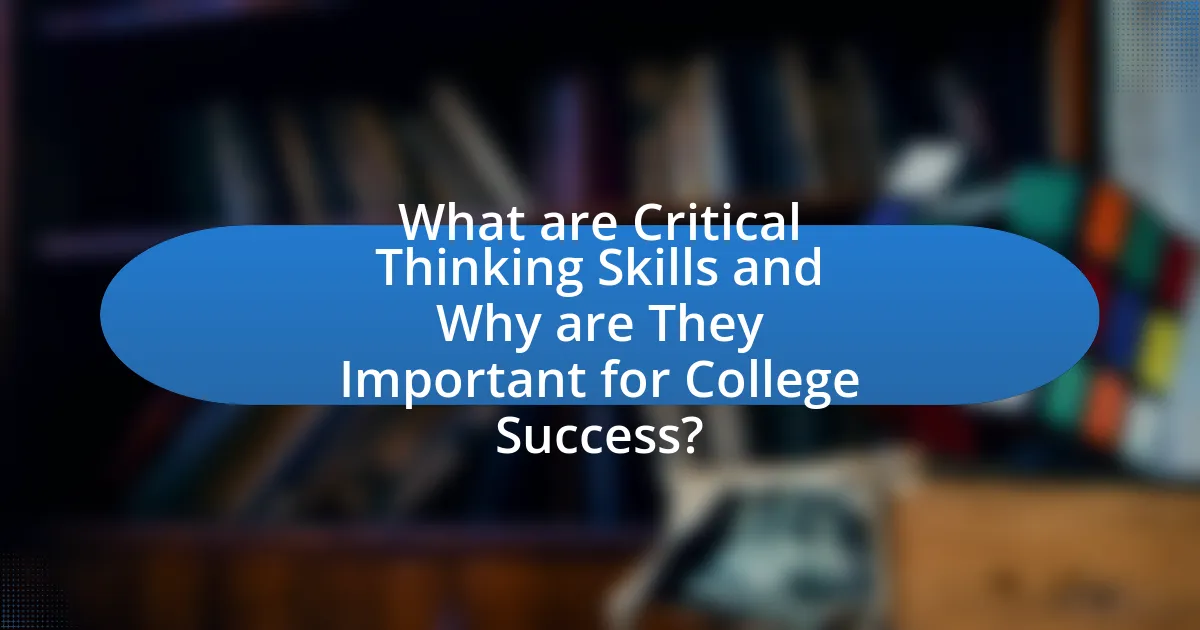
What are Critical Thinking Skills and Why are They Important for College Success?
Critical thinking skills are the ability to analyze, evaluate, and synthesize information to make informed decisions and solve problems effectively. These skills are crucial for college success because they enable students to engage deeply with complex material, assess arguments critically, and develop coherent, logical reasoning. Research indicates that students who possess strong critical thinking skills tend to perform better academically, as they can navigate challenging coursework and contribute meaningfully to discussions. For instance, a study published in the Journal of Educational Psychology found that critical thinking is positively correlated with academic performance, highlighting its importance in a college setting.
How do critical thinking skills contribute to academic performance?
Critical thinking skills significantly enhance academic performance by enabling students to analyze information, evaluate arguments, and solve problems effectively. These skills allow students to approach complex subjects with a structured mindset, leading to better comprehension and retention of material. Research indicates that students who engage in critical thinking demonstrate improved grades and higher levels of understanding in their coursework. For instance, a study published in the Journal of Educational Psychology found that students trained in critical thinking scored 15% higher on standardized tests compared to their peers who did not receive such training. This evidence underscores the direct correlation between critical thinking abilities and academic success.
What specific critical thinking skills are essential for college students?
Essential critical thinking skills for college students include analysis, evaluation, inference, and problem-solving. Analysis involves breaking down complex information into manageable parts to understand its structure and meaning. Evaluation requires assessing the credibility and relevance of sources and arguments, which is crucial for academic research. Inference is the ability to draw logical conclusions from available information, enabling students to make informed decisions. Problem-solving encompasses identifying issues, generating solutions, and implementing them effectively. These skills are vital for academic success, as they enhance students’ ability to engage with diverse perspectives and tackle complex challenges in their studies.
How can critical thinking skills enhance problem-solving abilities?
Critical thinking skills enhance problem-solving abilities by enabling individuals to analyze situations, evaluate evidence, and make informed decisions. When individuals apply critical thinking, they can break down complex problems into manageable parts, identify underlying assumptions, and consider multiple perspectives. Research indicates that students who engage in critical thinking demonstrate improved academic performance and better decision-making skills, as evidenced by a study published in the Journal of Educational Psychology, which found that critical thinking training significantly improved problem-solving outcomes among college students. This ability to systematically approach problems leads to more effective and innovative solutions.
What role does critical thinking play in effective decision-making?
Critical thinking is essential for effective decision-making as it enables individuals to analyze information, evaluate options, and foresee potential outcomes. By applying critical thinking, decision-makers can identify biases, assess the credibility of sources, and weigh evidence systematically. Research indicates that individuals who engage in critical thinking are more likely to make informed choices, as they consider various perspectives and implications before arriving at a conclusion. For instance, a study published in the “Journal of Educational Psychology” found that students who practiced critical thinking skills demonstrated improved decision-making abilities in academic and real-life scenarios. This evidence underscores the significant role critical thinking plays in enhancing the quality and effectiveness of decisions made.
How can critical thinking improve the quality of decisions made in college?
Critical thinking enhances the quality of decisions made in college by enabling students to analyze information critically and evaluate various perspectives. This analytical approach allows students to identify biases, assess the credibility of sources, and weigh the pros and cons of different options. Research indicates that students who engage in critical thinking are more likely to make informed decisions, leading to better academic performance and personal outcomes. For instance, a study published in the Journal of Educational Psychology found that students who practiced critical thinking skills demonstrated higher levels of problem-solving abilities and decision-making effectiveness compared to their peers.
What are the consequences of poor decision-making in an academic context?
Poor decision-making in an academic context can lead to significant negative outcomes, including decreased academic performance, increased stress, and potential long-term career implications. When students make poor choices regarding their studies, such as neglecting assignments or choosing inappropriate courses, their grades often suffer, which can result in lower GPAs and reduced opportunities for scholarships or advanced programs. Research indicates that students with lower academic performance are more likely to experience higher levels of stress and anxiety, which can further impair their decision-making abilities. Additionally, poor decisions can affect a student’s reputation and relationships with peers and faculty, potentially limiting networking opportunities essential for future career success.
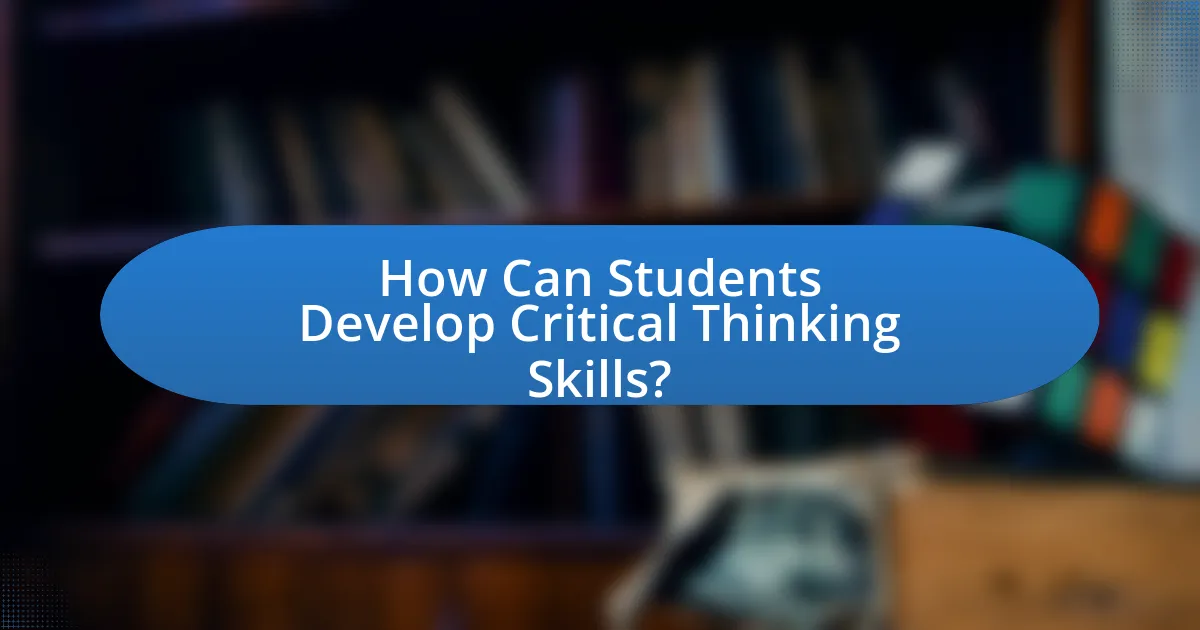
How Can Students Develop Critical Thinking Skills?
Students can develop critical thinking skills by engaging in activities that promote analysis, evaluation, and synthesis of information. Participating in debates, analyzing case studies, and solving complex problems encourages students to think critically about various perspectives and outcomes. Research indicates that students who engage in collaborative learning and inquiry-based projects demonstrate improved critical thinking abilities, as these methods require them to articulate their reasoning and challenge assumptions. For instance, a study published in the Journal of Educational Psychology found that students who participated in structured peer discussions showed significant gains in critical thinking skills compared to those who did not.
What strategies can be employed to enhance critical thinking?
To enhance critical thinking, individuals can employ strategies such as engaging in reflective thinking, practicing problem-solving, and participating in discussions that challenge assumptions. Reflective thinking involves analyzing one’s own thought processes and biases, which can lead to greater self-awareness and improved reasoning skills. Problem-solving exercises, such as case studies or real-world scenarios, encourage individuals to apply critical thinking in practical contexts, fostering analytical skills. Additionally, discussions that challenge assumptions promote the evaluation of different perspectives, enhancing the ability to assess arguments critically. Research indicates that these strategies can significantly improve critical thinking abilities, as evidenced by studies showing that students who engage in reflective practices and collaborative discussions demonstrate higher levels of critical thinking skills (Facione, 2011).
How does engaging in discussions foster critical thinking?
Engaging in discussions fosters critical thinking by encouraging individuals to analyze different perspectives and articulate their reasoning. This process requires participants to evaluate evidence, question assumptions, and synthesize information, which are essential components of critical thinking. Research indicates that collaborative dialogue enhances cognitive skills; for instance, a study published in the Journal of Educational Psychology found that students who participated in structured discussions demonstrated improved analytical abilities compared to those who engaged in solitary study. Thus, discussions serve as a practical platform for developing critical thinking skills essential for academic success.
What role does reading critically play in skill development?
Reading critically plays a crucial role in skill development by enhancing analytical thinking and comprehension abilities. Engaging with texts in a critical manner allows individuals to evaluate arguments, identify biases, and synthesize information effectively. Research indicates that students who practice critical reading demonstrate improved problem-solving skills and greater academic performance, as evidenced by a study published in the Journal of Educational Psychology, which found that critical reading strategies significantly correlated with higher grades in college courses. This process not only fosters deeper understanding but also equips learners with the tools necessary for effective communication and informed decision-making.
How can practice and feedback improve critical thinking abilities?
Practice and feedback enhance critical thinking abilities by providing opportunities for individuals to apply reasoning skills in real-world scenarios and receive constructive evaluations. Engaging in regular practice allows learners to confront complex problems, analyze information, and develop solutions, which strengthens their cognitive processes. Feedback serves as a crucial mechanism for identifying strengths and weaknesses in reasoning, enabling individuals to refine their thought processes and approach to problem-solving. Research indicates that students who engage in reflective practices and receive timely feedback demonstrate improved analytical skills and decision-making capabilities, as evidenced by studies showing a correlation between feedback and enhanced academic performance in critical thinking assessments.
What types of exercises can help strengthen critical thinking skills?
Engaging in exercises such as problem-solving tasks, debates, and analytical writing can significantly strengthen critical thinking skills. Problem-solving tasks require individuals to analyze situations, evaluate options, and make decisions based on evidence, fostering logical reasoning. Debates encourage participants to consider multiple perspectives, enhancing their ability to assess arguments critically. Analytical writing, which involves evaluating sources and constructing coherent arguments, further develops the ability to think critically about information. Research indicates that these types of exercises not only improve critical thinking but also enhance academic performance, as demonstrated in studies published in educational journals.
How important is self-reflection in the development of critical thinking?
Self-reflection is crucial in the development of critical thinking as it enables individuals to analyze their thoughts, beliefs, and experiences. Engaging in self-reflection allows learners to identify biases, question assumptions, and evaluate the reasoning behind their conclusions. Research by Dewey (1933) emphasizes that reflective thinking is essential for effective problem-solving and decision-making, highlighting its role in fostering deeper understanding and insight. Furthermore, studies indicate that self-reflection enhances metacognitive skills, which are vital for critical thinking, by promoting awareness of one’s cognitive processes and improving the ability to assess and adjust one’s thinking strategies.
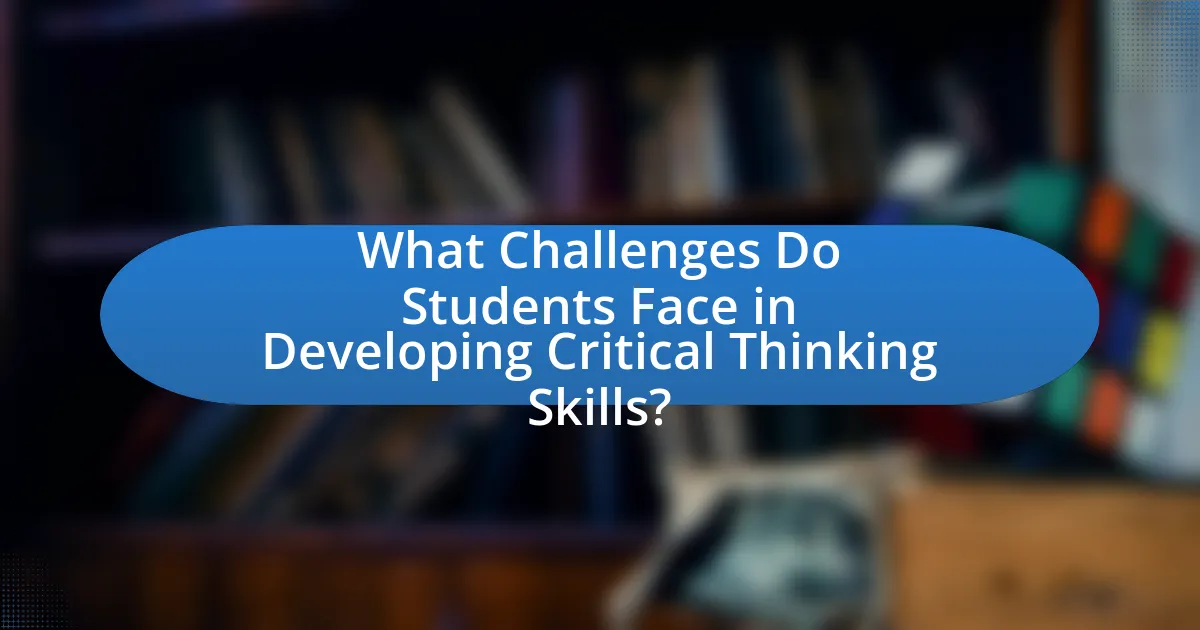
What Challenges Do Students Face in Developing Critical Thinking Skills?
Students face several challenges in developing critical thinking skills, including a lack of exposure to critical thinking exercises, insufficient guidance from educators, and the prevalence of rote memorization in educational systems. Research indicates that many curricula prioritize factual recall over analytical skills, which limits opportunities for students to engage in higher-order thinking. Additionally, educators may not receive adequate training to effectively teach critical thinking, resulting in a gap between the skills students need and the instruction they receive. Furthermore, students often encounter cognitive biases and emotional barriers that hinder their ability to analyze information objectively. These factors collectively impede the development of critical thinking skills essential for academic and professional success.
What common obstacles hinder the development of critical thinking?
Common obstacles that hinder the development of critical thinking include cognitive biases, lack of exposure to diverse perspectives, and insufficient practice in analytical skills. Cognitive biases, such as confirmation bias, lead individuals to favor information that supports their pre-existing beliefs, thereby limiting objective analysis. A lack of exposure to diverse perspectives restricts the ability to evaluate different viewpoints critically, which is essential for well-rounded thinking. Additionally, insufficient practice in analytical skills, often due to educational systems that prioritize rote memorization over critical engagement, prevents the development of effective reasoning abilities. These factors collectively impede the cultivation of critical thinking necessary for academic and personal success.
How can a lack of confidence affect critical thinking skills?
A lack of confidence can significantly impair critical thinking skills by leading to hesitation in decision-making and an inability to evaluate information objectively. When individuals doubt their abilities, they may avoid engaging in complex problem-solving or analyzing situations thoroughly, which are essential components of critical thinking. Research indicates that self-efficacy, or belief in one’s capabilities, directly correlates with cognitive performance; for instance, a study published in the Journal of Educational Psychology by Bandura and Locke (2003) found that higher self-efficacy enhances motivation and cognitive engagement, thereby improving critical thinking outcomes. Consequently, without confidence, individuals may struggle to articulate their thoughts, consider alternative viewpoints, or challenge assumptions, ultimately hindering their analytical skills and academic success.
What impact does a rigid educational system have on critical thinking?
A rigid educational system negatively impacts critical thinking by limiting students’ ability to engage in analytical reasoning and problem-solving. Such systems often emphasize rote memorization and standardized testing, which discourage creativity and independent thought. Research indicates that students in flexible learning environments, where inquiry and discussion are encouraged, demonstrate higher levels of critical thinking skills compared to those in rigid systems. For instance, a study published in the Journal of Educational Psychology found that students exposed to collaborative learning strategies scored significantly higher on critical thinking assessments than their peers in traditional settings. This evidence underscores the detrimental effects of rigidity in education on the development of essential critical thinking skills.
How can students overcome these challenges?
Students can overcome challenges in developing critical thinking skills by actively engaging in problem-solving activities and seeking feedback from peers and instructors. Engaging in discussions, participating in group projects, and analyzing case studies fosters critical thinking by encouraging students to evaluate different perspectives and solutions. Research indicates that collaborative learning environments enhance critical thinking abilities, as demonstrated in a study by Johnson and Johnson (1994), which found that students in cooperative learning settings performed better in critical thinking assessments compared to those in competitive or individualistic settings. Additionally, utilizing resources such as writing centers and tutoring services can provide targeted support, helping students refine their analytical skills and improve their academic performance.
What resources are available to support critical thinking development?
Resources available to support critical thinking development include educational programs, online courses, books, and workshops. Educational programs, such as those offered by universities, often include curricula specifically designed to enhance critical thinking skills through structured coursework and practical applications. Online platforms like Coursera and edX provide courses focused on critical thinking, often developed by reputable institutions, allowing learners to engage with the material at their own pace. Books such as “Critical Thinking: A Beginner’s Guide” by Sharon M. Kaye and “Thinking, Fast and Slow” by Daniel Kahneman offer foundational knowledge and techniques for improving critical thinking. Workshops conducted by educational institutions or professional organizations provide interactive experiences that foster critical thinking through group discussions and problem-solving activities. These resources collectively contribute to the development of critical thinking skills essential for college success.
How can peer collaboration aid in overcoming obstacles?
Peer collaboration aids in overcoming obstacles by facilitating diverse perspectives and shared problem-solving strategies. When individuals work together, they can combine their unique skills and knowledge, leading to innovative solutions that may not have been reached independently. Research shows that collaborative learning environments enhance critical thinking skills, as students engage in discussions that challenge their viewpoints and encourage deeper analysis. For instance, a study published in the Journal of Educational Psychology found that students who participated in collaborative learning demonstrated higher levels of critical thinking and problem-solving abilities compared to those who worked alone. This evidence underscores the effectiveness of peer collaboration in navigating challenges and fostering academic success.
What Practical Tips Can Help Students Enhance Their Critical Thinking Skills?
To enhance critical thinking skills, students should engage in active questioning and reflection. This involves regularly asking questions about the material they study, such as “What is the evidence for this claim?” or “What are the implications of this argument?” Research indicates that students who practice questioning are better able to analyze and evaluate information, leading to improved critical thinking abilities. Additionally, participating in discussions and debates encourages students to articulate their thoughts and consider multiple perspectives, further strengthening their critical thinking skills.
How can students create a personal action plan for improvement?
Students can create a personal action plan for improvement by first identifying specific areas where they need to enhance their skills or knowledge. This involves self-assessment to determine strengths and weaknesses, followed by setting clear, measurable goals for improvement. For example, if a student struggles with analytical writing, they can set a goal to complete a certain number of writing exercises each week.
Next, students should outline actionable steps to achieve these goals, such as enrolling in relevant workshops, seeking feedback from peers or instructors, and dedicating time for practice. Research indicates that structured goal-setting and regular self-reflection significantly enhance learning outcomes (Locke & Latham, 2002). By tracking progress and adjusting the plan as needed, students can ensure continuous improvement and development of critical thinking skills essential for college success.
What daily habits can foster a mindset conducive to critical thinking?
Daily habits that can foster a mindset conducive to critical thinking include engaging in reflective journaling, practicing active listening, and seeking diverse perspectives. Reflective journaling encourages individuals to analyze their thoughts and decisions, enhancing self-awareness and critical evaluation skills. Active listening improves comprehension and allows for deeper understanding of different viewpoints, which is essential for critical analysis. Seeking diverse perspectives broadens one’s understanding of complex issues, promoting a more nuanced approach to problem-solving. Research indicates that these habits can significantly improve cognitive flexibility and analytical skills, which are crucial for academic success and effective decision-making.
